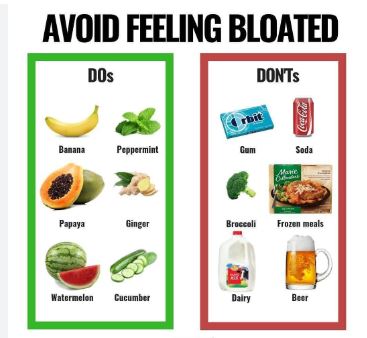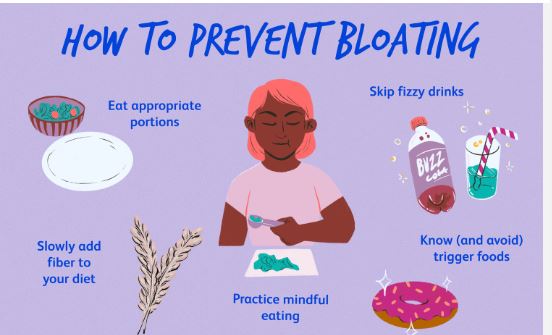Bloated stomach is characterized by a tight, full belly. It often occurs as a result of a gas buildup somewhere along the digestive system (GI). It frequently happens because of a gas buildup anywhere along the gastrointestinal (GI) tract. Bloating makes the tummy appear bigger than usual and can make it hurt or feel painful. Bloating can also result from the body’s fluid retention.
Bloating can be uncomfortable, but there are several ways to lessen it. Bloating can be quickly reduced with the aid of exercise, vitamins, massage, dietary modifications, and other methods.
The easiest method to deal with bloating is to identify its cause. Bloating is frequently brought on by: digestive problems. constipation, dietary allergies, and intolerances.
The pain and discomfort of bloating can be managed with the aid of numerous home treatments. People who want to fast get rid of a bloated stomach may find the following quick solutions helpful:
Take a Stroll
Exercise can help the bowels move more frequently, which can aid in releasing extra gas and feces. Getting the bowels to move is crucial for everyone who is experiencing constipation. A quick way to reduce gas pressure is to take a walk through the neighborhood.
Get Abdominal Massage
Moving the bowels might be aided by abdominal massage. Particularly beneficial is a massage that follows the course of the big intestine. The actions listed below can be used to accomplish this:
- Hands should be positioned directly over the right hip bone.
- Applying gentle pressure while rubbing in a circular manner up toward the right side of the ribcage.
- Moving in a straight line from the upper belly toward the left rib cage.
- Lowering oneself gradually toward the left hipbone.
- If necessary, repeat.
- It is preferable to stop the massage as soon as any pain appears.
Practice Yoga Poses
A few yoga positions can put the muscles in the belly in a position that helps the GI system release extra gas. It may lessen bloating. Squats, the Happy Baby Pose, and the Child’s Pose can all help people release a buildup of gas quickly.
Consider Medical Conditions
Bloating can occasionally be a symptom of a medical issue. A person may require medical assistance to diagnose and treat their illness in order to get rid of this bloating.
Bloating may be a symptom of inflammatory bowel illness, such as Crohn’s disease and ulcerative colitis. This symptom may also be brought on by irritable bowel syndrome (IBS).
Gynecological diseases like endometriosis and ovarian cysts can also make you feel bloated, inflamed, and in pain in your abdomen.
People who have these symptoms should talk to a doctor about them. The doctor will also want to hear about any pertinent family medical history and other underlying illnesses. To check for any issues, the doctor could prescribe diagnostic testing. These could be an ultrasound, colonoscopy, X-ray, or blood test.
Modest Increase in Fiber
Increasing your fiber intake can help you avoid bloating and constipation. It’s essential to keep in mind, that consuming too much fiber or increasing fiber consumption too soon might exacerbate gas and bloating. If you consume more than 70 g of fiber per day, you may have negative effects. It is better to start cautiously when increasing fiber intake and gradually increase over a period of weeks to give the body time to acclimate to the change in diet.
Have a Warm, Soothing Bath
An upset stomach may feel better after taking a hot bath. Reduced stress levels may improve GI tract performance and lessen bloating. This is something that may be achieved through relaxation.
Utilize Essential Oils
According to studies, utilizing essential oils containing fennel and curcumin has been successful in easing IBS symptoms like bloating and pain in the abdomen. Essential oils should not be consumed without first consulting a physician. This is due to the lack of dose regulations and the possibility that some formulations may be harmful or conflict with medications.
Substitute Water for Soda
Gas can accumulate in the stomach while consuming carbonated, fizzy drinks. Bloating and bubbling in the stomach can also be brought on by the same carbon dioxide that makes soda and other fizzy drinks effervescent. Dietary sugars or artificial sweeteners might also result in bloating and gas. These problems are resolved by drinking water, which also relieves constipation.
Try not to Chew Gum
Some people may experience bloating due to the sugar alcohols in gum. Bloating and gas pain can also occur when air is swallowed during chewing. To freshen their breath instead, people can use peppermint or ginger mints.
Use Gastric relief Supplements
Anti-gas drugs like simethicone pills and liquid can help push extra air out of the digestive tract. It is crucial to take medications as directed on the label at all times. Gas relievers are available at pharmacies and online.
Be more Active each day
Exercise may help you have more frequent bowel movements by helping your body move stool and gas out of the colon. Exercise can aid in reducing water retention by causing the body to sweat out surplus salt. It’s important to remain hydrated before and after working out because dehydration can make constipation worse.
Consume Food Consistently
After a large meal, bloating is a common complaint. Eating numerous smaller meals throughout the day can assist to keep the digestive system flowing and prevent this from happening. Food that is swallowed fast may enter the digestive system with air. Drinking using a straw can also cause people to inhale more air, which results in gas and bloating.

Try Probiotics
Intestinal probiotics are beneficial bacteria. Probiotic supplements may assist in controlling the intestinal bacteria that might result in gas production and bloating.
Reduce Sodium Intake
The body holds onto water when salt levels are too high. This can make the stomach feel big and bloated, as well as other parts of the body including the hands and feet.
Check out the Supplements and Drugs
Constipation and other gastrointestinal symptoms can be brought on by several supplements, including iron. This can make you bloat more. Contrarily, potassium may aid to alleviate bloating by balancing the body’s sodium levels.
Aside from indigestion, medications might have negative effects that alter GI function. If this occurs, a doctor or pharmacist can recommend substitutes that are easier on the digestive system.
When to see a Doctor (click here to read)

God bless you ma